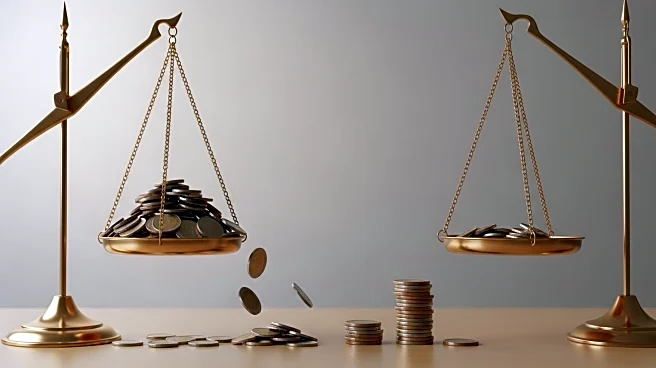What's Happening?
A recent survey conducted by JPMorgan reveals a significant disparity in economic confidence between high-income and low-income earners in the U.S. High-income respondents rated their confidence at 6.2 out of 10, with more than half expressing optimism
about their financial outlook. In contrast, low-income earners reported a confidence score of 4.4, highlighting concerns over inflation and economic pressures. The survey indicates a 'K-shaped' economic recovery, where well-off Americans continue to spend while lower earners face challenges in covering monthly expenses. This division is further reflected in spending habits, with higher-income individuals planning to increase spending on nonessential items.
Why It's Important?
The disparity in economic sentiment underscores the uneven impact of economic recovery across different income groups. High-income earners' optimism may drive consumer spending and economic growth, while low-income earners' struggles could exacerbate social inequalities and limit economic mobility. This division has implications for policymakers, who may need to address the needs of lower-income groups to ensure a more equitable recovery. The survey results highlight the importance of targeted economic policies and support measures to bridge the gap between different income brackets.
What's Next?
Policymakers and economic analysts will likely focus on developing strategies to support lower-income earners and address inflationary pressures. Potential measures could include targeted financial assistance, job creation initiatives, and efforts to stabilize prices. The ongoing economic recovery will be closely monitored to assess its impact on various income groups and adjust policies accordingly. Stakeholders, including businesses and advocacy groups, may push for reforms to promote economic equity and support vulnerable populations.
Beyond the Headlines
The income-based division in economic sentiment raises ethical considerations about social justice and economic fairness. Addressing these disparities may require a reevaluation of existing economic structures and policies to promote inclusivity and equal opportunities. The long-term implications of a 'K-shaped' recovery could influence societal dynamics and political discourse, shaping future economic and social policies.















